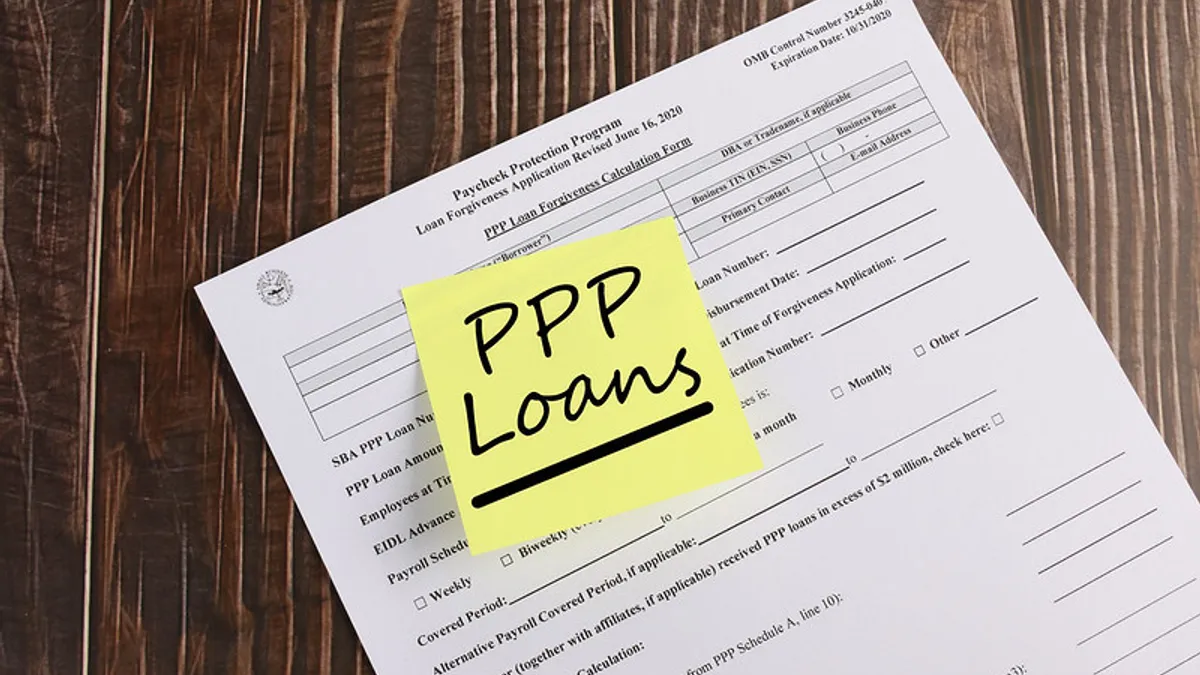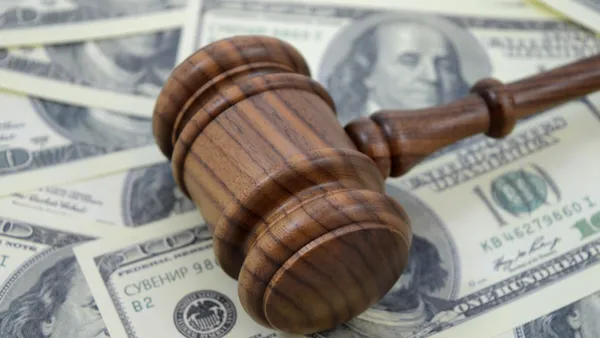Dive Brief:
-
The Small Business Administration (SBA) on Wednesday launched a portal that allows small businesses that took out Paycheck Protection Program (PPP) loans to apply for forgiveness directly with the agency.
-
The SBA said the new portal will streamline applications for loans $150,000 or less for the 6.5 million businesses that applied for the government-backed coronavirus relief loans. Lenders are required to opt in to the program, which will begin accepting applications from borrowers Aug. 4, the SBA said.
-
More than 600 banks have opted in to the program so far, the SBA said. Those banks represent 2.17 million borrowers, or 30% of loans $150,000 or less that have not yet applied for forgiveness, according to the agency.
Dive Insight:
"The SBA’s new streamlined application portal will simplify forgiveness for millions of our smallest businesses — including many sole proprietors — who used funds from our Paycheck Protection Program loans to survive the pandemic," SBA Administrator Isabel Guzman said in a statement. "The vast majority of businesses waiting for forgiveness have loans under $150,000. These entrepreneurs are busy running their businesses and are challenged by an overly complicated forgiveness process. We need to deliver forgiveness more efficiently so they can get back to enlivening our Main Streets, sustaining our neighborhoods and fueling our nation’s economy."
Chris Hurn, CEO and founder of Fountainhead Commercial Capital, which is part of a group of lenders that have been piloting the program over the past couple of weeks, said he believes the launch of the portal will dramatically benefit borrowers and lenders.
"It's a fairly simple process," he said. "[Borrowers] will interface directly with SBA, which is not something they'd done up to this point. ... It definitely will benefit the lenders, because now, I think you're going to see the authority of the SBA to encourage these borrowers to begin their forgiveness applications."
Hurn said 83% of Fountainhead’s PPP portfolio from 2020 has been forgiven.
"There's a few other percentages of folks that are sort of moving through that process, but we have this difficult 10-11% that, despite dozens of emails, outbound phone calls, and all the media about this, haven't started their forgiveness application," he said.
Hurn said he thinks having the SBA participate more directly in the forgiveness portion of the PPP will speed up the process.
"At least I think that's what the agency's hoping for, and certainly the lending community is hoping for as well," he added.
The application should take less than 10 minutes to complete, Patrick Kelley, associate administrator for SBA’s office of capital access, told The Wall Street Journal. The SBA said it has also created a PPP customer service team to answer questions and directly assist borrowers with the applications.
So far, Customers Bank is the largest bank to opt into the program, according to The Journal. The Wyomissing, Pennsylvania-based bank has made more than 320,000 PPP loans worth a total of $9.6 billion.
"The streamlined and efficient SBA PPP loan forgiveness portal will help borrowers and lenders move forward with economic growth and job creation following the pandemic," Sam Sidhu, president and CEO of Customers, said in a statement. "We encourage other lenders to join Customers Bank and opt-in to the SBA portal."
Expediting the PPP forgiveness process also serves the interests of the SBA, a government agency whose rollout of the program suffered several technical hiccups, Hurn said.
"I think SBA is ready to move on past PPP. It's been a pretty grueling 18 months of PPP and I think the agency’s attitude in general is they want to get back to programs that they know how to do well and move past some of these pandemic programs," he said.
The cost of the program is also a factor, Hurn said.
"The economics work better overall if they can pound through 70-80% of the 2021 loans over the next few months," he said. "That will end up saving the agency and the U.S. taxpayer a lot in interest costs."
The PPP was established as part of the $2 trillion CARES Act, passed by Congress in March 2020. The loans, which are forgivable if used to retain workers in addition to other permissible expenses, have provided more than $798 billion in coronavirus relief aid to the nation’s small businesses during the pandemic.












